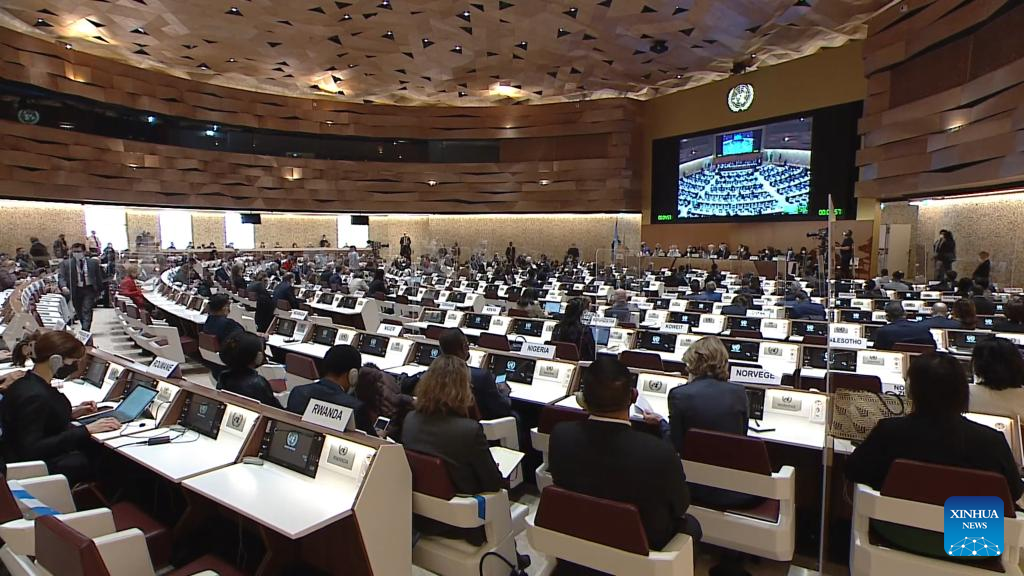
The Human Rights Council during the address of Michelle Bachelet, UN High Commissioner for Human Rights at the UN headquarters in Geneva, Switzerland, June 13, 2022. [Photo/Xinhua]
By Alfred de Zayas
From May 22 to 26, High Commissioner Michelle Bachelet conducted a mission to China in order to strengthen cooperation with the Office of the United Nations High Commissioner for Human Rights (OHCHR), human rights experts and mechanisms. As stipulated in her mandate, she offered advisory services and technical assistance with a view to advance the transparent implementation of China's human rights obligations.
Bachelet was guided by "the principles of impartiality, objectivity and non-selectivity, in the spirit of constructive international dialogue and cooperation." On May 28 at Guangzhou, she issued a comprehensive and nuanced end-of-mission statement, "to respect the sovereignty, territorial integrity and domestic jurisdiction of States."
Bachelet thanked Chinese authorities for their cooperation and acknowledged the progress achieved by Beijing in bringing millions of Chinese out of poverty and improving the enjoyment of human rights nationwide and supporting implementation of the right to development in the world. She also expressed concern over a number of outstanding issues and established a working group to follow up.
On June 10,2022, a number of UN rapporteurs issued an unprecedented press release indirectly criticizing the High Commissioner for not acting more forthcoming on allegations of genocide in Xinjiang Uygur Autonomous Region and urging Beijing "to address specific and systematic human rights violations," enable a"credible" international investigation and "grant unhindered access to independent experts." Such a statement is highly unusual and raises the question whether the rapporteurs were acting in conformity with their code of conduct that commits them to "impartiality and even-handedness."
In past sessions, UN rapporteurs have been called to order for exceeding their mandates and failing to observe Article 6 of the code, which requires them to "seek to establish the facts, based on objective, reliable information emanating from relevant credible sources and to take into account in a comprehensive and timely manner, in particular information provided by the State concerned." China has provided such information, which some rapporteurs evidently ignored when drafting their statement of May 10.
As a former Independent Expert on International Order (from the year 2012 to 2018), I do not recall any comparable statement being issued concerning gross and systematic violations of human rights in countries such as the United States, Canada, UK, France, Germany, Saudi Arabia, etc. Such blatant double-standards undermine the authority and credibility of the rapporteurs.

The opening of the 49th session of the UNHRC held at the UN headquarters in Geneva, February 28, 2022. [Photo/Xinhua]
On June 13, the 50th session of the United Nations Human Rights Council (UNHRC) opened with Bachelet's unexpected announcement that she would not seek a second term. In the Council room and in the internet, some non-governmental organizations (NGO) engaged in a mobbing action against Bachelet, which is contrary to the conduct required of NGOs in order to enjoy consultative status. It is time for the HR Council to formalize a code of conduct for NGOs and ensure that it is enforced. Indeed, some NGOs have issued defamatory statements that would justify stripping them of their status.
On June14, 69 States joined in a statement to the Council opposing interference in China's internal affairs. The statement was read by the representative from Cuba, recalling the language of Article 2(7) of the UN Charter, stipulating that "nothing contained in the present Charter shall authorize the United Nations to intervene in matters, which are essentially within the domestic jurisdiction of any State."
Also on the same day, China's Permanent Representative to the UN Office in Geneva Chen Xu stated that multilateral human rights mechanisms should serve as a platform for cooperation and dialogue, rather than a venue for division and confrontation. He regretted that in recent years "the Human Rights Council has become increasingly politicized and confrontational, and disinformation has become rampant."
Discussions at the Council once again demonstrate that some States, NGOs and even some UN rapporteurs do not understand the mandate of the Council or the High Commissioner's functions under General Assembly Resolution 48/141.
The High Commissioner's vocation is not "naming and shaming," nor does she undertake country visits for propaganda purposes or to advance the geopolitical agendas of certain countries and sovereign governments. Bachelet has taken a results-oriented approach in order to ensure progress where it matters - not in the media, but in the actual enjoyment of human rights by real people, including in China.
As a former UN Independent Expert, I decry the growing politicization of United Nations institutions and the"weaponization" of human rights to demonize geopolitical rivals and pursue agendas incompatible with the letter and spirit of the UN Charter.
Notwithstanding the vulgar instrumentalization of human rights by some States, NGOs and rapporteurs, it is important to reaffirm that Bachelet's mission to China was an exercise in the best traditions of the United Nations, consistent with the guiding principles and purposes of the UN - notably peace, human rights and development.
Alfred de Zayas is a professor of international law at the Geneva School of Diplomacy and was United Nations Independent Expert on Promotion of a Democratic and Equitable International Order 2012-18. He is the author of ten books, including "Building a Just World Order."

 中文
中文



